by DAVID ROLINSON
“in keeping with the modernist sensibility and self-reflexivity of Hide and Seek and Only Make Believe, the decision to root a view of the past in the experiences and imagination of a writer protagonist, emphasises the fact that, far from being an objective assessment, any perspective on history can only ever be subjective” – John R. Cook.1
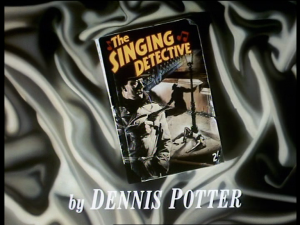
This one-day symposium, staged by Royal Holloway University of London on 10 December 2011, celebrated the 25th anniversary of The Singing Detective (1986).2 It paid tribute to the serial’s “narrative complexity, generic hybridity and formal experimentation” and placed writer Dennis Potter’s contribution alongside the contributions made by his collaborators, several of whom were present: producer Kenith Trodd, choreographer Quinny Sacks and actors Patrick Malahide and Bill Paterson.3 Other guests included Peter Bowker (as a modern television writer inspired by Potter), plus academic speakers and, mixing practitioner and academic perspectives, Professor Jonathan Powell, who was Head of Drama at the BBC when The Singing Detective was made. This mixture of academic and practitioner perspectives has been a welcome and often rewarding feature of British television drama conferences in recent years: see, for instance, the conference proceedings published as part of British Television Drama: Past, Present and Future.4
This piece is partly a report of the day’s proceedings, and partly an essay responding to some of the ideas raised. In the interests of maintaining topicality, it was written in a bit of a rush and my writing here has some rough edges, but hopefully there are enough points of interests to compensate for the more clunkily-written and long-winded bits, and for my assumption that you already know a little about the series, its production and how it’s been studied.
After introductions, and Trodd paying tribute to absent friends – those who were billed but unable to attend, plus Potter himself – the first main panel, ‘The Creators: Innovation in Production’, began with a clip of the serial’s ending, the first of Trodd’s carefully-programmed extracts. Trodd’s opening address combined a return to his earlier paper ‘Whose Dennis Is It Anyway?’5 with new asides, including his verdict on Emergency Ward 9, a Thirty Minute Theatre play written by Potter and story-edited by Trodd, which had been recently rediscovered.6 Mindful of the fact that this was to be screened the next day at the National Film Theatre as part of Missing Believed Wiped 2011, Trodd resisted spoilers but indicated his “shock” at some of its content (racial attitudes which, as he indicated, were presented but left to the audience to negotiate), noting that he had not got this from the printed word, an interesting observation given the difficulties that scholars face in reconstructing missing drama from scripts, documents, audios and other materials.7 I was at the Missing Believed Wiped screening the next day, where Trodd introduced Emergency Ward 9, and indeed it does warrant re-examination by critics over and above what has been done with the written text: as Trodd testified, his recurring anecdote about an actor protractedly messing up a scene was not reflected in the content. For the many Doctor Who fans in the Missing Believed Wiped audience, the two rediscovered Doctor Who episodes had comparable moments – but I’ve written about those episodes, and forms of memory, in the new issue of fanzine Panic Moon, so will say no more here.8 The screening of Emergency Ward 9 was well-received by the Missing Believed Wiped audience, and was a perfectly-timed rediscovery, given that several elements from it were reworked by Potter in The Singing Detective.9
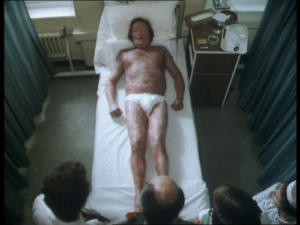
Trodd’s introduction established some useful contexts, even if this necessarily meant covering familiar ground for Potter scholars. He discussed his professional experience with Potter – that famously combustible writer-producer relationship – and critiqued Potter’s post-Singing Detective work on the grounds that Potter had become “confused by the spell of his own eminence” and had stopped listening, resulting in a hollowing-out exemplified by the problematic Potter-directed Blackeyes.10 Of course, this came after his falling-out with Trodd. Trodd was not writing off Potter’s later career – at other points during the day he was keen to advance the case for Karaoke and Cold Lazarus – but attesting to the power of The Singing Detective.11 This power also troubled Potter, whom Trodd described as being unable to speak after Trodd screened an emotionally overpowering extract from The Singing Detective. Filling in details on their place within the BBC, Trodd noted the irony that they felt like guerrillas fighting within what is now seen as a golden age.
Trodd’s amusing description of Potter’s “annoying” claim to not be writing autobiography but using the form of autobiography was also worth making, setting up some of the academic content later in the day. Although not developed in this talk, this point is central to the interplay of memory and authorship, subjectivity, Creation and creation in the serial. Again not discussed on the day, biographical-auteurist approaches reward but also imprison critics and viewers of The Singing Detective. As John R. Cook noted in his superb book on Potter, Mary Whitehouse’s assumption that Potter must by a dirty sex-obsessed writer because he, like Marlow, must have caught his mother up to no good, led to legal consequences.12 We could add Potter’s description of autobiography as “the most boot-lickingly brutish of all the literary arts, especially when it purports to wrestle with personal motive […] an inherently dishonest category of mislabelled fiction”.13 But he knew that, as he told Melvyn Bragg, “When the novelist says ‘I’ you know he doesn’t mean ‘I’, and yet you want him to mean ‘I’”.14
Questions of writer-centred analysis have already been problematised, in the studies by Joost Hunningher and others of Potter’s unprecedently close collaboration with director Jon Amiel,15 and the symposium’s next guest, Quinny Sacks, raised intriguing extra layers to the idea of authorial voice in the serial. Inevitably, the legendary Dem Dry Bones sequence served as introduction.
Interviewed by Trodd and Powell, Sacks discussed the “collaborative” role of choreographers, her preference for reading the whole script in order to try to capture the script and the director’s vision, rather than merely coming in to “do steps”. With something as “intangible” as dance, such routines would not be created by the writer. Indeed, other than the carefully-specified song and recording, the leeway for specifics is indicated by Potter’s published script:
The consultant and his team lip-sync to the zestful vocals, complete with clicking dry-bone sounds and bouncy music, whereas the rest of the ward (initially) carries on unaffected, unconcerned.
Driving, crashing rhythm, bone sounds, and then, up and down the ward […] exuberant, gleeful, the medical team move up a gear into the bone-by-bone enumeration of the song. Suddenly, and of course inexplicably, they have little reflex-testing hammers in their hands.16
The description continues for longer than this, but you get the point. Also, Potter’s script uses the word “diaphonous” in relation to one costume, which Sacks noted was one of the elements changed by herself and production designer Jim Clay. Choreography went beyond the music, into other elements of the sequence – including the medical staff’s walk into the ward – and elsewhere, such as Michael Gambon’s graceful movement. Sacks intriguingly stated that choreography is itself a form of writing (“-graphy”), adding another layer, and contrasted the approach here with the standard use of choreography in film – for instance, making choreography to an extent “invisible”.
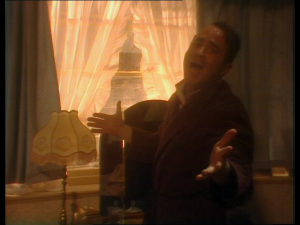
Other issues discussed included the impact on dance routines of the dramatic spaces in which they operated – the multi-camera studio for some of the songs in Pennies from Heaven, location filming on The Singing Detective – and the institutional spaces.17 Sacks, Clay and director of photography Ken Westbury were in effect left to their own devices for a few days. Trodd described the challenging conditions of staging such routines in the multi-camera video studio, with the clock ticking down to a 10pm finish, and felt that the serial worked in spite of the conditions and not because of them. This tallies with many academics’ privileging of cinema discourses as television’s final destination and barometer of “Quality TV”, but undersells the specificity of that environment, the way in which it presented “the possibility of a ‘poetic’ and metaphoric approach to social reality” as “the experiments and discoveries of contemporary, anti-naturalist theatre” were “shared with a television audience”.18 Indeed, as Graham Fuller observed, the cinema remake of Pennies from Heaven (1981) was a “formal failure”.19 If the essence of the method relied on the vital “seamlessness of the transition from conscious thought to song, back to conscious thought”,20 then television studio techniques play a part in this, resulting in transitions that are somehow more troubling and more difficult to reconcile in Pennies from Heaven than they are in The Singing Detective. Given that these stories depend, as John R. Cook observed, on Potter’s “psychological expressionism”, his “modernist impulse to ‘express’ individual subjectivity as more significant and more ‘real’ in many ways than external reality”21, the contrary nature of the studio, as theatrical-external space for psychological interiority, serves these ideas in interesting ways. To be fair, Trodd qualified his comments on the studio by reminding us that Potter wanted the hospital scenes of The Singing Detective to be shot on video in the studio, with a sense of wanting those scenes to be the most naturalistic, when multi-camera video was the dominant form of naturalism across television, and would persist as such in soap opera. But as Trodd noted, none of the directors approached for the series would countenance not shooting entirely on film, a marker of the shift to the pre-eminence of directors and cinematic approaches in certain dramatic forms in the period, but also of the reputation of the name directors who turned the series down.
Powell amusingly described his discussions with Potter; the disparity between the finished product and the Potter concepts that the BBC pre-sold around the world; the need to commission all six scripts at once; and the prevention of Powell commenting on the scripts between the sizeable payment and delivery.
Subsequent questions, both from Powell and the audience, brought extra fascinating detail from Sacks. Noting how the Dem Dry Bones sequence not only lightens the episode but “takes you inside to another layer of reality”, Sacks noted that lip-syncing is best achieved when the cast sing (not mime) on set, and that a whole routine was created: the choreographer can often be involved in an edit owing to its precision, but even this superbly rhythmical, layered sequence emerged not from a restrictive pre-ordained set of requirements but from choices made from the options her routine left the director and editor.
There was an enforced change of plan regarding the second ‘Creators’ panel, ‘Innovation in Performance’, so we ended up with two separate panels. Although different in tone, the separate Trodd interviews with Bill Paterson and Patrick Malahide were enjoyable and thought-provoking.
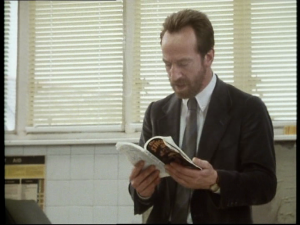
Paterson was an amusing and lively interviewee. There were reminiscences about the readthrough (the whole thing over two or three days) and the value of a readthrough, both in general and in particular for such a layered piece of work in which different actors worked in separate but thematically interlinked blocks. Paterson described his first meeting with Potter – seemingly spiky but on Potter’s terms friendly – and Potter’s set visits, the detail of design in Gibbon’s room, plus the omnipresence of disused hospitals for filmmakers. Anecdotes about productions ranged from amusing readthrough moments through to specific examples of contemporary television’s regular “flakiness” and “lack of preparation” even for top-level drama.
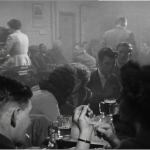
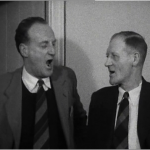
There was a screening of Between Two Rivers, a 1960 Denis Mitchell documentary fronted by Potter, whose feelings regarding his depiction of the Forest of Dean fed directly into events in Stand Up, Nigel Barton and a recurring traitor theme, and provided a milieu that attended to another layer of The Singing Detective.22 I must confess to ducking out of the screening, having rewatched the documentary and early Potter plays several times last year while researching an article, and having screened it in the past when teaching The Singing Detective.23 But its inclusion was clearly highly relevant, and judging from the response from scholars who were newer to Potter’s work, impactful.
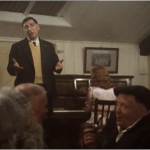
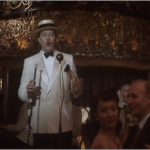
Again interviewed by Trodd, Malahide discussed the challenges of playing Binney/Finney, in effect – as he put it – three manifestations of the same character, from the Third Man strand to Nicola’s manipulative lover (agent/agent). Malahide made a thoughtful and precise contribution, with an insight into how we “peel away the layers” of the story. He gave examples of moments when the complexity of narrative layers caught Amiel off-guard, such as a sudden switch between Binney and Finney which Malahide realised had not been shot, with Amiel wondering if the script’s use of names was just Potter being “careless” (Trodd gave a similar anecdote). Malahide graciously attributed success to the script, and noted that it hardly changed from readthrough to finished product, although Trodd usefully problematised this by pointing out that Potter and Amiel’s collaboration had led to it being reworked before the readthrough stage.
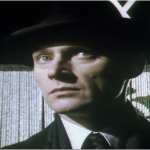
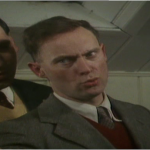
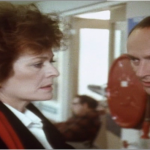
Again, discussion turned towards the differences between television production then and now, which served an important role in reminding academics of the facilitating role played by industry, institutional discourses and spaces. A 1990s John Birt seminar was discussed, at which the bottom-up commissioning structure, with regional centres, was to be replaced by a committee and the second-guessing of what the public might want to see. Here, Malahide asked who would commission a drama about a writer in bed with psoriasis, set to music. This restructure was described as reversing the organics of British television. Malahide provided grim examples, from his career as writer, of faults in the commissioning process, and also noted, from his work as an actor, how late green-lighting can cause chaos on productions. In terms of filming, the time for readthroughs, breaks for rehearsals and other lost elements were put in context by Powell’s stark description of how the production pattern of Tinker, Tailor, Soldier, Spy would now be different.24 At the end of the panel, Trodd recalled a seminar on the BBC’s future at which market share was the only topic – as Trodd put it, without other criteria the BBC cannot survive – and both criticised the concept of “market fault” (BBC services such as Radio 4 which exist because the market cannot provide them), stating instead that the BBC model produced great shows and, as Malahide noted, paradoxically also created shows that could make money.
In a gripping section, Malahide described the unpleasant personal impact of the tabloid furore over the serial’s sex scenes, and provided some amusing anecdotes of “droll recognition moments”, but the confidential tone makes me avoid going into either set of anecdotes here. He also discussed his battles to prevent the most famous scene from being used in clip shows out of context.
Malahide’s enthusiasm for the show was clear – he explained that it was his experience as a writer that contributed to his hearty laughter during the clip that introduced him, in which a studio requested rewrites and shattered Nicola’s dreams. (However, given that this scene was itself a creation by Marlow, more time for questions might have led to probing on how an actor handles such a sequence: interviewees have in the past indicated Potter unsettling Malahide’s vision of one of the characters by crushingly pointing out that that character was not real.) When asked what else in his career compared with The Singing Detective, Malahide bluntly replied “very little”, though he spoke warmly of Middlemarch and Minder (asked a similar question, Paterson identified The Crow Road).
After John Ellis paid deserved tribute to Trodd’s generous presentation stint, the symposium’s emphasis shifted to the academic with two papers which, while a little marooned as the only papers of their type, and hamstrung by seemingly pre-set limits (the understandable if reductive theme of the serial’s subsequent influence), brought some key issues into sharp focus.
First speaker, noted film scholar Professor Timothy Corrigan, opened his case for The Singing Detective’s influence on cinema by claiming it as an “almost futuristic”, prophetic piece. Corrigan focused on its narrative innovations, in particular those relating to convergence and adaptation. The ways in which the serial explores classical film narrative and overlapping narrative discourses were put in the context of cinematic antecedents including film noir (Marlow versus Bogart’s Marlowe), wherein the detective is normally outside events whereas in The Singing Detective, the detective is inside them. For Corrigan, the dissipation and deconstruction of classical narrative – amidst the serial’s “disjunctive” qualities and “contending discourses” –made this a timely pinpointing of the modern narrative crisis: “all solutions and no clues”.
Corrigan related The Singing Detective to developments in recent cinema, including the rise of “video game logic” and Jeffrey Sconce’s concept of “smart cinema” as discussed in the film journal Screen in 2002.25 Reading Sconce’s piece after the symposium, it’s a useful reference point: true, there are moments that limit smart cinema’s potential application to Potter’s specific contexts – its discourses of art cinema and irony, its displacement of “subjectivity” (surely crucial to The Singing Detective). However, its references to nihilism and “the ‘personal politics’ of power, communication, emotional dysfunction and identity” are of clear relevance.26
Corrigan explored useful parallels between The Singing Detective – with its blurring of worlds, disruption of linear causality and querying of reality – and what Thomas Elsaesser called “mind game films”. Referring to the “new spectator and audience relationship”, Corrigan noted the viewer’s need to reorganise narrative space. Indeed, this relationship has been discussed by Potter scholars in the past, such as George Brandt’s statement that Potter’s narrative strategies “energise the viewer […] to put in some effort in order to follow the story”27 Corrigan noted the “dynamic of viewer interactivity”, the relationship between temporality and consciousness, contingency and chance. Elsaesser’s “productive pathologies” were briefly mapped onto Marlow, and Corrigan contemplated its “adaptive pathologies”, its suspension of distinctions between sanity and insanity, and its recurring manifestation of “moments”.
Corrigan rightly brought up the “extraordinary meta-adaptation” at work in The Singing Detective. This series, with an “afterlife” as a script book, both featuring a writer rewriting his own book “into something else in my head”, was usefully related to “convergence cultures”. However, Corrigan’s (openly and fairly acknowledged) lack of detailed Potter scholarship closed off the development of these excellent ideas of convergence and “multi-authorship”. Take the prose from the fictional book The Singing Detective that Gibbon reads back to its author, Marlow: our consideration of the idea of the writer’s sickness and subjectivity is complicated precisely by convergence and multi-authorship, as this is actually a section from Potter’s own book Hide and Seek, which the serial revisits and reworks just as it reworks Emergency Ward 9 for its hospital scenes, Stand Up, Nigel Barton for the school scenes, as well as making reference to other series like Pennies from Heaven.28 There is a sense of Potter in conversation with himself, not simply on an autobiographical level but a form of multi-authorship multi-media convergence taking place across his works.29 That is to say that – brace yourselves! – Potter’s book is partly adapted as Marlow’s book, which is adapted by Marlow in his head while a traitor tries to sell a film adaptation (though this too is Marlow adapting reality, complete with spoken punctuation), while Reginald reads his book in time to the television serial’s adaptation of the script, which became a script book, and was adapted into a cinema screenplay in which Potter “totally re-thought” the serial),30 reworked other previous plays, and was made for the cinema after his death: and all these layers are grounded in Potter/Marlow/both/neither quote-unquote autobiography. (And Potter’s Karaoke and Cold Lazarus return to elements of the serial too, as Trodd intimated.) Characters confront their own fictionality, though Potter’s idea of making ‘Noddy’ the real author were among the ideas lost to Amiel’s testing collaboration.
Of course, Corrigan’s lack of Potter scholarship does not detract from the usefulness of placing his work within these reference points. To examine this, I’ll dip out of reporting the conference for a while and try to think through some of the ideas raised. For instance, if we return to Elsaesser’s ‘The Mind-Game Film’, we find the identification of “new forms of spectator engagement and new forms of audience address” which reveal a “crisis in the spectator-film relation”:
…the traditional “suspension of disbelief” or the classical spectator positions of “voyeur,” “witness,” “observer” and their related cinematic regimes or techniques (point-of-view shot, “suture,” restricted/omniscient narration, “fly on the wall” transparency, mise-en-scène of the long take/depth of field) are no longer deemed appropriate, compelling, or challenging enough…31
The rise of digital and DVD box set culture and its scope for multiple viewings had therefore encouraged greater complexity in certain areas of popular cinema, which Elsaesser observes as a tendency rather than a genre. The extent to which these are actually characteristics of art cinema – Elsaesser observes the “irresolvable ambiguities and inconsistencies” in David Lynch’s Lost Highway (1997)32 – could also be of interest, since Potter, in common with many television dramatists of the period, respected the mass audience’s intelligence and receptiveness to techniques that would now be seen as avant-garde. For British television drama, and its audiences, many of the debates and strategies associated with complex narrative are old news.
Academic debates on complex narrative throw up further useful points of reference for Potter’s work. In a special double issue of Film Criticism, Charles Ramirez Borg provided a taxonomy of “alternative plots”: the polyphonic or ensemble plot, the parallel plot, the multiple personality (branched) plot, the Daisy Chain plot, the backwards plot, the repeated action plot (whether one character repeating an action or one action being seen from different perspectives), the Hub and Spoke plot (intersecting storylines), the jumbled plot, the subjective plot (“a character’s internal or ‘filtered’ perspective”), the existential plot and the metanarrative plot.33 Several of these sub-headings provide points of interest in relation to The Singing Detective, but it and, inevitably, British television drama in its entirety are absent. The Singing Detective would have been an excellent reference point for Elliot Panek’s piece in the same issue on poets, detectives and psychological puzzle films.34
Therefore, Corrigan has provided a useful service in relating debates on narrative complexity to The Singing Detective, and we can hope that other dramas and dramatists are incorporated into such debates on complex narrative, which remain associated with American film and contemporary American television. The Film Criticism piece helpfully lists a variety of antecedents – from Sherlock Jr (1924) to 8½ (1963) – to add to its modern examples from Fight Club (1999) to Gus Van Sant’s Elephant (2003), itself an example of multi-authored convergence from Alan Clarke’s 1989 British television Elephant.
Returning to Corrigan’s paper: whether claiming Potter as “prophetic” or a direct influence, Corrigan’s references to films such as Adaptation (2002), Inception (2010) and Being John Malkovich (1999) provide useful points of reference for Potter scholars and film scholars alike. Of course, identifying influence is a problematic approach for academics, too often leading to reductive work, and leaving space for shared influences. For example, the sex-and-death cross-cutting scene in The Singing Detective has direct echoes of a scene from Bad Timing (1980) by Nicolas Roeg, whose work shares so many signatures with Potter that when they finally worked together on Track 29 (1988), critics noted the difficulties of disentangling their respective, shared signatures. (Track 29 was also another Potter self-adaptation, revisiting Schmoedipus.)35
If Corrigan preferred notation of prophecy to the mapping of influence, the next speaker, Glen Creeber, was careful to evidence the direct, stated influence of Potter on high-profile American television dramas, with direct quotation and welcome use of extracts. Although I’m familiar with Creeber’s earlier work on Potter, I must confess that at time of writing I haven’t yet read his BFI TV Classics book on The Singing Detective,36, so am aware that my responses may be suggesting things that he’s already done…
Creeber began by relating The Singing Detective to Potter’s response to Troy Kennedy Martin’s often-cited ‘Nats go home’ call for non-naturalistic form, as well as seeking to contextualise Potter’s representation of “the inner flux of the mind” to the work of Virginia Woolf, Alain Resnais and others. Addressing the difficulty of gauging influence, Creeber quoted the likes of Mark Frost – co-visionary of Twin Peaks – and Tom Fontana. Creeber claimed Oz as Potter’s “illegitimate child”, given Fontana’s inspiration – seeing Pennies from Heaven, Fontana felt that “the possibilities of TV are so much more than what we are doing” – and used the following clip as evidence. (Warning: contains stuff that TV announcers would warn you about.)
Augustus Hill’s statements that “the fact that the mind can survive is a miracle” showed him as a comparable “eloquent tour guide in his own private hell”. This fascinating parallel also encourages me to revisit the often startling Oz, for which many thanks.
Creeber also used a clip from The Sopranos with clear thematic parallels: Tony Soprano remembering his childhood witnessing of a crime (from behind a tree!) that changed his outlook. Of course, the parallel here is thematic rather than formal. There is none of the formal experimentation or non-naturalism with which the paper started. Tony looks into a mirror, signposting clearly that he is looking into himself – and we see what he remembers, using the conventional, classical form of a flashback. Earlier in the day, Kenith Trodd argued that more study should be made of how The Singing Detective enters and leaves flashbacks (which some of my students have done superbly over the years when I’ve set that task). This sort of analysis shows that, in The Sopranos, we do not enter Tony’s subjectivity in any comparable way – the worlds remain clearly demarcated – but come to achieve more understanding of character motivation through watching his origins, in a classical representation of character centrality. This is by no means a weakness, but raises issues of form and content that are worth pausing to consider.
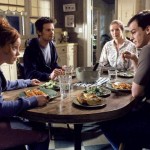
Creeber’s most compelling comparison with Potter – the “messy” and “complex” Six Feet Under – was illustrated by a moment in which musical elements serve as disruptive interruption, which got me thinking about how often (though not in Creeber’s case!) critics are in danger of minimising Potter’s achievement by claiming dramas are Potteresque because they have musical elements – quick reference is made to Buffy the Vampire Slayer’s musical episode – without that being mapped onto formal experimentation or modernist non-naturalism. Indeed, we could use Potter’s comments on the series Cop Rock to note his own distinction between different uses of music:
[It] was a long way from what I was trying to do, because first of all the music was new music, and secondly it seemed to be a comment upon the scenes. In Pennies the music didn’t come out of a character situation as instinctively as a speech would have done, and it wasn’t a comment upon the speech. It shifted the scene […] it wasn’t an interlude, it wasn’t added on, it was part of the drama. […] it’s that very subtle distinction between using the music in one particular and fertile way with all its resonances, and using it as something added on. That’s what the MGM Pennies became – a series of production numbers that made little connection with the characters.37
Creeber’s paper focused on American television, following the dominant broadsheet/academic position that British television has lost its capacity for experimentation and entered a “conservative phase in terms of form”. Creeber isn’t arguing that British television is not capable of radical drama, and he openly acknowledged that there would be exceptions, which he encouraged us to debate in questions after the paper (although sadly the day’s overrun meant that there would be no time for this). There are indeed exceptions, and more striking ones than his own suggestion of Bleak House as radical drama: for instance, Random in 2011 was both socially conscious and subjective as interiority broke into external drama.38 A playful variation on Potter’s Hide and Seek and other works can be found in Reichenbach Falls, with its interplay of character, author and influence.39 Creeber’s argument that Potter would now be working for HBO is unobjectionable in the sense that his reputation remains high amongst noted practitioners, and it creates enticing counterfactuals. However, it does also neglect the fact that HBO collaborate with the BBC for creatively ambitious projects (such as God on Trial) and the fact that HBO is a subscription channel for those with “taste” and money (interlinked in British broadsheets, as ever) which is the antithesis of Potter’s belief in television as a democratic medium overturning establishment status boundaries. (Not that Potter was averse to contradicting himself.) Creeber clearly acknowledged this potential objection by making reference to complex narrative in network drama. (Similarly, Peter Bowker later picked out The West Wing as a better comparison with Potter than some, because it was attracting wider audiences on a major channel.)
Where British television drama has failed – and the practitioner anecdotes of Malahide, Paterson and others helped to put this into industrial contexts – is in eroding the space for the kind of authored, modernist, non-naturalistic dramas that Potter made. The lack of bold drama of this type is undeniable and damaging – but then we could debate the extent to which American television drama has this sort of drama either. American television has indeed had a wealth of complex series which rightly make it the centre of interest for many scholars, from genre series which use those tropes for social comment to the showrunner model as a form of “authored” drama. The rich variety of American series can indeed be superior to comparable forms in Britain. It would be weird to attack American television drama for its lack of other dramatic forms (the radical single play or authored serial) or for its lack of Potteresque modernist subjectivity. We can agree that Deadwood and The Wire are excellent without being concerned that they aren’t in the Potter tradition. But let’s be consistent – British television drama is not allowed similar slack in terms of what it does compensating for what it doesn’t do. It seems disingenuous to use The Sopranos as an example of quality American television of a different type, while condemning British television drama without reference to its compelling work of a different type, from Random to the one-offs and serials of people like Peter Kosminsky, campaigning drama documentary and other forms that remain bold and distinctive elements of contemporary British TV drama. This is not a criticism of Creeber’s paper, but of the broadsheet critics used during the paper (entirely reasonably) as evidence of critical tendencies. Despite contributing a lot to Television Studies, “Quality TV” debates have had the unfortunate (side?) effect of factoring-out forms of ideologically, politically and formally radical and/or oppositional forms of drama. Amusingly, as if to spell this out, early in Creeber’s paper, mention of some of the inspirations of Potter’s generation, including Brecht, was met by a fire alarm that left delegates standing in the car park, admiring the Orwellian surroundings of Senate House. Either that, or Creeber fell foul of the Brecht Alarm that has been set up in many Universities. (Or perhaps I’m underestimating Glen and he did it on purpose to make sure we were immediately distanciated.)
In the interests of balance, the final panel – and one of the day’s highlights – was an interview between contemporary British television writer Peter Bowker and the excellent Potter scholar John R. Cook. A lively, analytical and often very funny interviewee (I’ve removed the swearwords), Bowker attended not only to Potter’s influence on his work but to their respective careers.
Following a clip of the opening sequence of Blackpool,40 Bowker described the differences between his and Potter’s use of songs in conception and application (for instance, being able to hear the singers’/mimers’ voices), his own karaoke metaphor, music used “to represent a heightened form of dialogue”, and the space for different voices – indeed, he found Pennies from Heaven a bigger influence than The Singing Detective. Whereas Arthur in Pennies from Heaven had no other way to express himself than in song, characters in Blackpool (and in Blackpool) were in a world in which people broke into song/karaoke. Bowker amusingly described the budgetary restrictions on choices of songs – occasionally making “virtues” out of “tacky” songs. Songs had to fit characters’ likely musical awareness – Bowker dropped a Nick Cave song – and in some cases (the Smiths’ The Boy With The Thorn In His Side) avoided giving a song to the character who would get that song in a conventional musical. The following clip wasn’t shown during the paper, but I need little encouragement to use it.
Bowker stressed that he had been more influenced by Potter in thematic terms than in the specific use of music. (Later, Cook noted some fascinating thematic parallels between Potter’s work and the ideas in Blackpool that Bowker had not overtly considered but which he acknowledged were there.) Pressed by Cook on the “internalising” function of songs in The Singing Detective, Bowker discussed the issue of whether characters know that other characters are singing.
Using the analogy of people choosing not to play football after seeing George Best play, Bowker described his willingness to “have a go”with devices that others may have been frightened to use given their associations with Potter (“Peter Bowker’s doing a Dennis Potter”): this and other tools were things no longer exploited in British television, which even for Bowker, a successful writer in modern British television drama, was less “audacious” and “adventurous” than American television drama. Bowker partly related this to critical tendencies in Britain (working in parallel with Cook’s observation of the lack of unanimity in praise for Potter’s serial), quoting a certain Radio Times critic’s astonishing statement that Blackpool was a great show ruined by the song and dance elements that were in fact central to it, and critics’ dislike for his movement from the seemingly naturalistic Occupation to seemingly more frivolous approaches in his next work.41 Bowker convincingly described the more multi-layered thematic and intertextual bases of Occupation to challenge this. For Bowker, the dominant journalistic question – “Is this true?” neglected the idea that work can be “true” in a deeper sense. Although the same question has led to the neglect of other forms, such as even the most journalistic of drama documentary work, this sense of deeper truth compromised by obsession with the literal “truth” of its surface elements is the sort of issue that Potter was often forced to counter with this sense of a deeper truth.
Responding to earlier comments about the failings of British television drama, Cook and Bowker’s conversation took in a wide range of television, from scripted-reality shows to Clocking Off, from Jimmy McGovern to The Promise and The Shadow Line, an apprenticeship on Casualty to script-doctoring Rome. Bowker insisted that “there are ways of punching through”, with examples including the genesis of his Flesh and Blood.42 The “fundamentals of story remain the same”, although he did acknowledge issues regarding infrastructure. The conversation, and subsequent questions, took in advice for new writers, the impact of the showrunner model, and the space to not necessarily write his opinion of an issue because drama is not about that (a useful addition to Trodd’s earlier comments on Emergency Ward 9).
Bowker’s admiration for The Singing Detective shone through, with references to magical moments (such as Gambon’s performance in the closing scenes), and his admiration for Potter. If anything, he thought that his own career was nearer to that of Alan Plater or Jack Rosenthal than of Potter – however, as he memorably commented, nobody’s career is like Dennis Potter’s.
A closing announcement regarding a special edition of the Journal of Screenwriting stressed not only the space for academics and practitioners to contribute, but also the welcome space for people beyond academia and production – namely, viewers – who are encouraged to send their memories of watching the series.
If I’ve interrogated some of the comments and papers here, it’s not an itemisation of faults (of which there were very, very few), but because I’m an academic (sorry). It was a very stimulating and enjoyable day, with lots of chatty tea breaks with friends and colleagues old and new, and an interesting mixed approach that made for a fitting tribute to a drama (and a mode of drama) that was both popular and serious without any question of dividing those into separate categories.
Originally posted: 20 December 2011
Updates:
10 December 2011: minor corrections to expression.
February 2012: added reference to Reichenbach Falls.
31 March 2012: added details of a doctoral research studentship (Glasgow Caledonian University and the University of Gloucestershire) on the topic ‘Seeing the Blossom’: Original Manuscript Research within the Dennis Potter Archive, Forest of Dean, Gloucestershire. (Deadline Friday 13th April 2012.)
12 September 2012: removed details of scholarship. Briefly tidied expression in a couple of paragraphs. Replaced some of the poorly-done screengrabs (squeezed, wrong ratio) with correct ones.

Pingback: Beyond the reach of the cartographer: Dennis Potter the reviewing writer and writing reviewer | British Television Drama
Pingback: The Singing Detective (1985) – “We’ll Meet Again…” | Flickbook